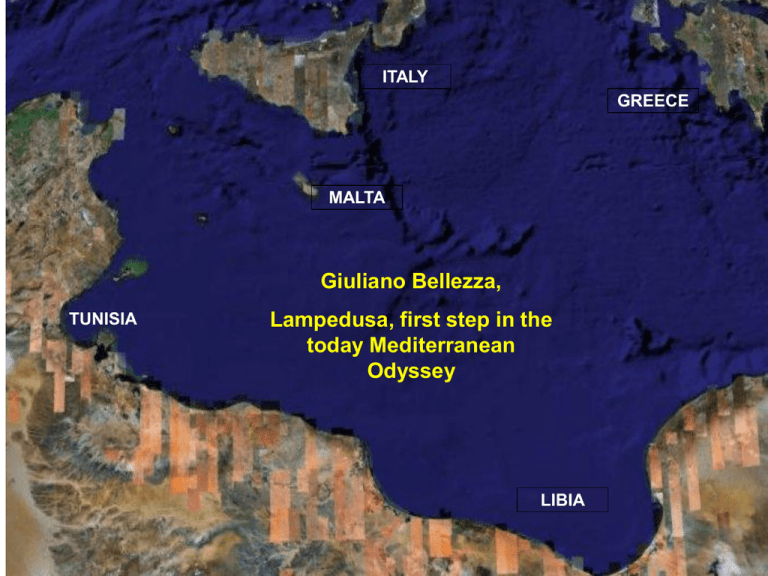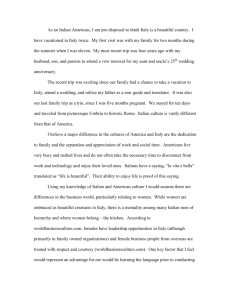Diapositiva 1 - Home of Geography
advertisement

ITALY GREECE MALTA Giuliano Bellezza, TUNISIA Lampedusa, first step in the today Mediterranean Odyssey LIBIA ITALY, total resident population in millions : Dec 2002, 57.3 millions Dec 2003, 57.9 millions Dec 2004, 58.5 millions Dec 2005, 58.7 millions Dec 2006, 59.1 millions Dec 2007 59,650,000 Aug 2008 59,905,000 2.6 millions in 5.5 years, meaning 400,000 yearly, that is about 0.7 %, much more than the European mean, which is about 0.2 %: WHY? Because the increment is due to the non Italian population: Foreigner residents: January 2008: 3.433,000 Born in 2007 more than 64.000 - dead 3.670 Natural increment 1,7%, twofold respect Italians, eightfold respect Europeans Under 18: 767,000 (22%) / under 3 about 340,000 (10%) In a country suffering hard emigration until the 1960’s, this is posing difficulties every year harder. Italian population was totally unprepared to share the space with the immigrants. It has been a sad surprise to discover how many Italian don’t want any others nearby. Italians have good reputation abroad as “brava gente”: good people. This is maybe true when doing peace keeping, in Lebanon or in Afghanistan. We should admit that in Italy, along with the number of immigrating people, racism also is growing. Total flow upsetting in very short time The flow of immigrant in Italy began in the 1960’, when many women arrived, usually from catholic regions (Philippine, Cabo Verde, Latin America, Kerala and other Indian States), then from former African Colonies. Always through the intermediation of missions abroad and parishes in Italy. They found work as housekeepers, to mind the kids, taking them to school, or to look after the old people. Quiet people, no troubles of any kind, working in rather wealthy families, in a period when Italian women were abandoning the traditional housekeepers position, finding a job: this allowed them to pay a housekeeper and save money for their own expenses. Until the ’80s nobody considered immigration as a danger. But when in the ’70s a male immigration also began in Italy, the Italian (and European) industries were not in conditions to employ new workers: the arriving men had to look for something else. A Tunisian immigrant fisherman in a Sicilian harbor; photo in G.Bellezza, Geografia, Roma, Editori Riuniti, 1978 In the 1970’s the first immigrating men in Italy were mainly coming from the Mediterranean African coast, bound to the Southern Italy (the so said Mezzogiorno). The most were coming as agricultural seasonal workers, during the harvest period. Quite a lot were fishermen, or simply taking any job in the fisher boats of Sicily. This photo, from a book of mine (1978), was the first in an Italian book of Geography. Too many Italian teachers were still more interested in the name of rivers and capitals, than in the life of manhood. Immigration: the first great explosion from Albania The first explosion arrived from Albania, since the beginning of the Kosovo war, and lasted for years. Every night small boats started from little Albanese harbours, reaching the coast of Apulia (minimum distance about 70 km). Very often the irregular immigrants were forced to abandon the boat before landing by the so said scafisti (snakeheads in English) . Sometime the scafisti used a very old large boat, with hundreds of immigrants, abandoning the ship at some distance from the coast, escaping on very speed small boats when arriving in Italian waters. The refugees were in the first moments shut in shanty temporary shelters (in the photo they are under police control): The Apulian population: not wealthy people, gave a wonderful example of high civilization, helping to nourish the refugees. The Government tried to convince them to go back to Albania, and eventually repatriated them forcibly. An agreement was signed with the Albanian Government. Italian industries were helped to open factories in Albania, so saving the local economy and creating employments. Reducing this wave of immigrants to Italy has been possible, because Albania is a very small country, though the number of Albanese immigrants (350.000) is still growing. It has been calculated that between 1998 and 2006 some 474 people died along this short Adriatic route, and 136 corpses have never been found. But a second, and much bigger explosion of immigrants soon began: this time they were arriving from Southern Mediterranean Statistics of the Ministry of Interior Affairs In 2006, more than 18,000 irregular immigrants landed in Lampedusa: 82% of the more than 22,000 arriving seaborne to Italy. About 6,000 of them asked for political asylum, immediately in Lampedusa or later. This figure is nearly 60% of the grand total of asylum requests in Italy for 2006. The small town and harbour, in the south-eastern tip of the island. Lampedusa The north-western tip of the island, with innumerable but useless repairs (see later) The Island of Lampedusa receives many times more irregular immigration then Pantelleria. Just a look at the map, and a question arises: 85 km 74 km Pantelleria 83 km² - 7,664 inhab., density 92 why Lampedusa and not Pantelleria, nearer to both coasts, wider and less populated? Of course, there are explanations: geographical explanations. TUNISIA 200 km Linosa MALTA 113 km Lampedusa 30 km² - 6,137 inhab., density 204 A glance over some islands in the so called “Sicily Channel” Why Lampedusa and not Pantelleria ? Clandestine boats were leaving Tunisia from the southern coast, far from the capital, so Lampedusa really was the nearest Italian repair. Lampedusa is an arid barren island, while Pantelleria is volcanic, with fertile soils, actively cultivated: private owners are more alert in protecting profitable properties. The scafisti look for small, hidden mooring, where they could easily land without being immediately discovered: possibilities are many in Lampedusa, few in Pantelleria. Furthermore, there are other differences into the same island of Lampedusa. Lampedusa Pantelleria Why never on Lampedusa northern coast? The northern coast is a sheer rocky slope, a near vertical cliff raising more than 100 meters from the sea. Why southern and not northern Lampedusa ? The southern coast is rich in hidden moorings and beaches; the scafisti can abandon the boats, hide for hours, and be confused with the refugees. Arriving at a small island The arrivals from the African coast started abruptly, with old insecure boats (carrette, that is old carts in Italian). Some times the immigrants were found after landing, but in a short time the coast guards needed to rescue them at sea: in a short time this became its main duty, and is still growing. A phase still going on In some months the patrolling radars alerted the coast guard of the arriving boats. The coast guard had to start a kind of tug boat service, towing the carrette to the harbour. The scafisti are trying very often to remain hidden among the immigrants, joining them in asking to remain in Italy. We should remember that the scafisti are only snaketails. The real heads are very rich people, who will never take risks at sea. We can’t even be sure that the highest heads are not European. Moreover, the main course have changed: Lampedusa really is the nearest island, as now the boats are mainly leaving from Libya.. Short but deadly route, racism Nobody knows the real amount of people dead only in the Canale di Sicilia in the last years, but the figure was surely more than 2,000 in 2006. This narrow strip of sea sadly qualify as the most dangerous immigrant route from Africa to Mediterranean. Actually, the statistics include in the trans-Mediterranean route even the trip (down at left) from West Africa to Mediterranean, via Canary Island and Gibraltar, with 1500 deaths This is an epochal phenomenon that appears impossible to stop, and notwithstanding the protest of right political movements blaming the Government for being too permissive, and eventually winning the 2007 national elections. At right, a poster of the Lega, the racist party of northern Italy, which started in the late ’80s asking for independence from Italy. Their first racist proclamations were against Rome and southern Italy. Still, in Lampedusa the flag of Lega fluttered, not only on some buildings and restaurants, but on the town hall, when they won the local election. Is there any reasonable reason? Yes, we will see soon After landing in Lampedusa The State prepared a centre for temporary reception (CAT in Italian) to host refugee for some days, before transferring them to Sicily: still an island, but 800 times larger. The daily arrivals were too much, so the CAT was enlarged several times, but it was always hosting much more people then scheduled. Arrivals are less frequent during winter, but it might happen that for some days the weather conditions doesn’t allow passenger boats from and to Sicily, so the refugees remain days and days more. We will see that in the last months the situation became much, much worst. Geopolitical observation: small islands, far from the mainland and near to the coast of other States, encounter particular problems. To tell but one example, in a period of acute tension between Italy and Libya, from the Libyan missile bases two rockets were launched to Lampedusa, and felt at sea very close to the harbour. After, but since many years, this very small islands became the main entrance for clandestine, irregular immigrants in Italy. An incredible episode happened to some sailors who saved people of a sinking boat: treated as scafisti and prosecuted, captain in prison for weeks, boat confiscated for months. It only took very few weeks to understand that this was not a temporary phenomenon: about 10 km of the southern coast of Lampedusa had taken the place of nearly 200 km of Apulian coast. In Apulia, the potential immigrants were some dozens thousands Albanese people, and the 2 Governments found a way to stop the irregulars. Situation is different in Lampedusa: not only potential immigrants from Southern Mediterranean are truly innumerable, but their origins are undetectable: you can’t repatriate people without knowing where from are they coming, and no Country will accept unknown people. Politics in Lampedusa It seemed incredible, but in 2003 the racist, northern party Lega won the municipal elections in Lampedusa, the southernmost part of the Italian national territory. The Mayor’s action didn’t satisfy the population, so in 2003 he was not confirmed (since 1972 Mayors always won a second term). Anyway Lega was strong, and the former Vice Mayor was confirmed: a woman born in Marche Region, married in Lampedusa, where became very popular. She fiery opposed the building of a new CAT, the largest of Italy, to host up to 500 refugees, in what was supposed to be a protected area. Some time after she changed mind, and in 2007 she has been happy to inaugurate it. A strong oppositions surged soon, as the population was very unhappy. But an example, in the sanity field: to have an ACT (Axial Computerized Tomography) the Lampedusa inhabitants were forced to go to Sicily, waiting in a list for months (as it is for all Sicilians). Now a new ACT machine was situated in the CAT, but the inhabitants should line after the refugees. Why the new machine hadn’t been located in a public local structure, where refugees could of course be cared, but in a common waiting list, not as first? To question like this no reasonable answer was (neither is) possible. Problems for tourism Quite often the contacts between Sicily and the small islands nearby are suspended for days, due to weather conditions, and raising problems of food and water supply. Sometime this is due to damage in the regular boat’s engine, as happened in Lampedusa from 24th March to 8th April 2007. The problems grows in the tourist season, and the operators are angry and claim about the strong decrease of their activity. They say also that the clients don’t like to see the refugees. Actually, it is difficult that the tourists see refugees strolling around: only the boats towed by the coast guard arrive in the harbour, and the refugees are immediately taken to the CAT, to be sent to Sicily within 2-3 days. But operators also have some reasons, as the statistics demonstrate that: a) from 1999 through 2003 the situation had a very little improvement, while in Italy there had been a rather strong one; b) ever since 2004 the decrease has been strong, and for 2009 a total failure is forecasted. Local disputes: politics and cohabitation Winner of the last local elections in Lampedusa was a local movement: “Lampedusa e Linosa - Dino Sindaco”. Dino stands for Dino De Rubeis, a local politician, who confirmed as Vice Mayor the former one, Angela Maraventano, Senator of the Lega in the Italian Parliament. Their agreement didn’t last too much, and since the summer 2008 he removed her many times, but always take her back soon. Today they are again strong enemies. The reason is that the Minister of Interior Affairs (Maroni, Lega) ordered the transformation of the CPT in CIE (Center for Identification and Expulsion). The Mayor says this is unrealistic and impossible, his Vice doesn’t want to say that the Minister is mistaking. Actually, in the center built for 500 persons, and enlarged for 800, there usually are 1000 and more. The party of the Minister had the program to stop immigration, and won the 2008 national election. To obtain the result, Berlusconi signed an agreement with Libya, promising a 5 billions euro refund for the colonization period, but nothing has been done ever after. Not surprisingly, in the last months the immigration took on an unprecedented speed: 18,000 in 2007, about 35,000 in 2008. The situation in Lampedusa worsened with the same pace, though still on 10 September a peaceful manifestation took place, and the inhabitants marched in the streets with the refugees, and once again this happened on 27 January. But it could not last with the CIE, as we will see in a moment. De Rubeis argues Lampedusa can’t continue this way, Maraventano accuse him to instigate a popular revolt. On 27 January, with more than 1300 refugees in the camp, the Mayor lead a peaceful manifestation, throwing flowers in the sea, to commemorate all the persons died when attempting to cross the Canale di Sicilia. Nearly all of the refugees escape from the camp, joining the manifestation and receiving a warm welcome from the population; at the end everybody went back into the camp: the Police had no reason to intervene. Some people is wondering why the refugees have been allowed to get out of the camp. 10 September 2008 Islander’s point of view Antonino Meli, editor since years of the website www.isoladilampedusa.it wrote me his viewpoint some weeks ago, on 1 February. First of all, he carefully stresses that this viewpoint is only his personal one. His critics focuses on the difficulties of the inhabitants. Water, gasoline and other commodities cost more. The first aid, still free in some Italian regions, costs 17 euros in Lampedusa, and to have an hospital check up one should arrive in Sicily: plane ticket euro 71. Islanders don’t oppose the institution of CIE in Italy, they simply say that it is impossible to have one in such a small island. He opposes the political ideas of Lega (a non Italian party, he says), but agrees with some of their critics. The action of many NGO in the island is totally useless, so why they receive funds to stay there? An Italian singer organizes yearly a sort of Festival (O’Scia), and gets lot of money for this: how is the money spent, given that the majority of the exhibiting artists performs for free? Moreover he poses several questions: why in January the police let all the refugees go out to join the manifestation? Did someone hope to see a real battle with the inhabitants? Probably some persons were waiting for this, and received a strong disillusion. Actually, in Southern Italy opinions like this are really widespread: the State is perceived as an evil enemy, always taking bad initiatives again the Mezzogiorno. On the other hand, he is very proud of being Italian: immigrants are an Italian problem to be solved, without crying for European help, he says. To better understand his thoughts, it Peaceful march is necessary now to clarify better what is a CAT and what is a CIE. 27 January 2009 What’s a CAT and what’s a CIE A Center for Temporary Reception is a place where someone is hosted with little comfort, waiting to be transferred in more suitable structure. The stay shouldn’t last more than a couple of weeks. A Center for Identification and Expulsion is a place where someone is identified and sent back to his country. A question of minutes, when someone has documents, rather impossible if he just has no ID. The stay should not last more than 6 months, but can be delayed up to 18. But if one doesn’t want to tell his nationality, there is no legal way to convince him. So, what was going to happen in a tiny island, where the CAT, built for 500 people supposed to remain less than 2 weeks, was already hosting more than 1000, and more immigrant were arriving daily, now bound to remain a minimum of 6 months? The situation could explode at any moment, but In Mr. Meli’s opinion, the Italian Government doesn’t care too much, because it is rather easy to hide what happens there. His words: from here only goes out WHAT THEY ALLOW TO GO OUT OR WANT TO BE KNOWN. His mail arrived me on 1 February: the peaceful period was going to stop abruptly, the following day. in the CAT or in the CEI: the life is not different February 2009: riots By the end of January, in order to give some relief in the CAT-CEI, about 100 refugees had been transferred in a nearly ruined structure for radar surveillance (Loran, Long Range Navigation). On 2 February Loran was partly destroyed by a fire, and (giving force to Mr. Meli’s suspicion) in the media this new had very little evidence, if any. The morning after the Minister said that it had been a minor accident, and the project of transfers would continue. In the mean time, in CAT-CEI the number of refugees reached 1300 (but the record remains to 17 October 2008: nearly 2000). Loran, 2 February 2009, before dawn Loran, 18 February , at dawn the riot begins On 18 February at dawn a riot began in the camp, the Police had to intervene, eventually throwing tear gas canisters. The rioters answered setting the structure on fire. Built with large use of plastic and light materials, the pavilions burned very easily, which caused hundreds of refugees try to escape, and the same policemen couldn’t remain. On both sides, more than 50 smoke poisoned persons needed to be treated. Police could stop the riot only at night, arresting 20 refugees. Lampedusa, February 2009 The sleep of reason brings forth monsters Last news: since the night 18-19 February 2009, hundreds of refugees had to sleep outside. In the island there are now more policemen than refugees. In the week end 21-22 February the coast guard rescued 540 immigrants at sea, and 9 after their landing in Lampedusa. Only in the center-left media this news is receiving due attention. Local, National, Global Politics: marine and terrestrial borders Being a small island, unwillingly become the first step on the maritime trail of tears is a burden unlikely to be solved. In the local political or administrative polls all the Italian political parties encounter only failures, with the incredible exception of the one whose complete denomination is “Lega Nord per l’indipendenza della Padania” (North League for the independence of the Po river region). I am sure, no other islands in the Mediterranean risks to undergo such a series of events, and I can’t find a similar situation in the whole world. There are some necessary simultaneous conditions that only here can be found, and I quote but a few A very high difference in per person GNP, as it is between Europe and Africa. A very short sea distance, possible to cover with in 20-30 hours. A source of innumerable quantity of potential refugees, looking only for nothing more than life. I am sure, no other islands in the Mediterranean risks to undergo such a series of events, and I can’t find a similar situation in the whole world. USA-Mexico border faces less difficult problems, and not do deadly: earth Lampedusa, NE tip ways are not dangerous as sea ones. Usa is larger than Mexico, while nobody can try to compare Lampedusa and Africa’s surfaces. I can’t agree with Mr. Meli: this problem is a continental scale one, which the same Italy can’t solve. Moreover, due to the distance, attempts to reach the US coast from Caribbean islands are but a few. In Lampedusa one third of the immigrants arrive from Morocco, Tunisia and Egypt, 30% from East Africa, 27% from Nigeria and Ghana, and the remaining arrive from Asian countries. Rather impossible to send them back, even when identified, as the agreement only concerns Maghreb. The refugees in USA from Mexico are 95% allegedly Mexicans, and are quickly sent back to Mexico, as their nationality is sure. My conclusion: Lampedusa in unique in the world, and this uniqueness is far from being a privilege.






